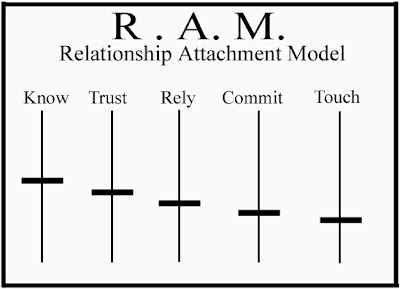Infidelity- is it more than a sexual matter?
Oft we hear "infidelity" and immediately associate it with adultery, however, in giving it some thought we will quickly see there is much more in being faithful to a spouse than abstaining from adultery. When we commit ourselves to someone through marriage we essentially vow "to have and to hold [our spouse], from this day forward, for better, for worse, for richer, for poorer, in sickness and in health, to love and to cherish, till death do us part". Or, as President Spencer W. Kimball taught "Marriage presupposes total allegiance and total fidelity".
We are commanded that we "shalt love the Lord [our] God will all [our] heart, and with all [our] soul, and with all [our] mind" (Matt. 22:37); our spouse is the only other person we are to love in the manner we love God. This being said, it is important to understand that it does not take two participating parties for infidelity to occur. One can be unfaithful through the mind and the heart.
Affairs can be categorized based on the type of involvement (emotional or physical) and the level of relational attachment (attached or detached). Fantasy, visual, romantic, and sexual are the four types of affairs there appears to be based on the former dichotomies.
Fantasy Affairs. These types of affairs are emotional and detached, meaning there is no physical relation with an outside party and there is no attachment- or in other words, with someone who is anonymous and would likely never be met. Examples of Fantasy affairs include romantically fantasizing about someone who is not your spouse (an actual person or a fictional character in a book, movie, etc.), flirting online, or simply imagining what life would be like with another person. The deeper the unfaithful spouse gets into their fantasy affair, the more emotionally detached they become from their family.
President Kimball has warned, “There must be no romantic interest, attention, dating, or flirtation of any kind with anyone” outside the bounds of marriage. “Even the thought of adultery is sinful.” President Harold B. Lee taught that “thought is the father of an act. No man ever committed murder who did not first become angry. No one ever committed adultery without a preceding immoral thought. The thief did not steal except he first coveted that which was his neighbor's.” It is important to remember "For as [a man] thinketh in his heart, so is he . . . (Proverbs 23:7).”
Visual Affairs (aka porn). These affairs are those that are detached and physical- which insinuates that the unfaithful spouse is acting out sexually. This is the most common type of affair. Pornography is any medium that elicits sexual arousal, and it is one of the greatest plagues of our day. It is found on the web, billboards, in books, magazines, music- almost everywhere.
President Kimball said, “There are those married people who permit their
eyes to wander and their hearts to become vagrant, who think it is not improper to flirt a
little, to share their hearts, and have desire for someone other than the wife or the
husband. Many acknowledge the vice of physical adultery, but still rationalize that
anything short of that heinous sin may not be condemned too harshly; however, the Lord
has said many times: ‘Ye have heard that it was said by them of old times, Thou shalt not
commit adultery: But I say unto you, that whosoever looketh on a woman to lust after her
hath committed adultery with her in his heart (Matthew 5:27-28.).’”
Romantic Affairs. Now we move on to the attached affairs. Romantic affairs are emotional and attached; they occur when an individual is becoming emotionally involved with a specific person other than his or her spouse. These are the type of affairs going on when you hear about cases where a person has successfully been balancing two lives/relationships and are caught. This kind of action is a result of trying to escape the monotony of everyday life.
"An adulterer might feel like he or she is empowered and reinventing his or her life.
However, research by Duncombe and Mardsen suggests that those who enter
affairs to escape everyday life will be disappointed over time, since everyday life has a
way of catching up with us. Initially the affair can seem spontaneous, romantic, and
thrilling. Over time “the exciting lover ceases to be a stranger and routine becomes the
enemy of spontaneity."
Sexual Affairs. These affairs are physical and attached and in some cases the onset is Visual Affairs. In contrast to the Romantic Affair, a Sexual Affair occurs
when a person engages in adultery with or without
emotional attachment.
President Kimball warned, “The
adversary is subtle; he is cunning, he knows that he cannot induce good men and women
immediately to do major evils so he moves slyly, whispering half truths until he has his
intended victims following him, and finally he clamps his chains upon them and fetters
them tight, and then he laughs at their discomfiture and their misery.”
Many will
justify their [affairs] claiming their love is dead, however President Kimball taught that when love wanes or dies “it is often infidelity of thought or act which gave the
lethal potion.”
I am so grateful for the guidelines God has so lovingly given us in order to protect and nourish our marriages. If you are interested in learning how to avoid infidelity-which we are all subject to no matter how much we love our spouse- you can find some very useful tips by reading INFIDELITY: PROTECTING OUR MARRIAGES by Scott Gardner & Christian Greiner.







